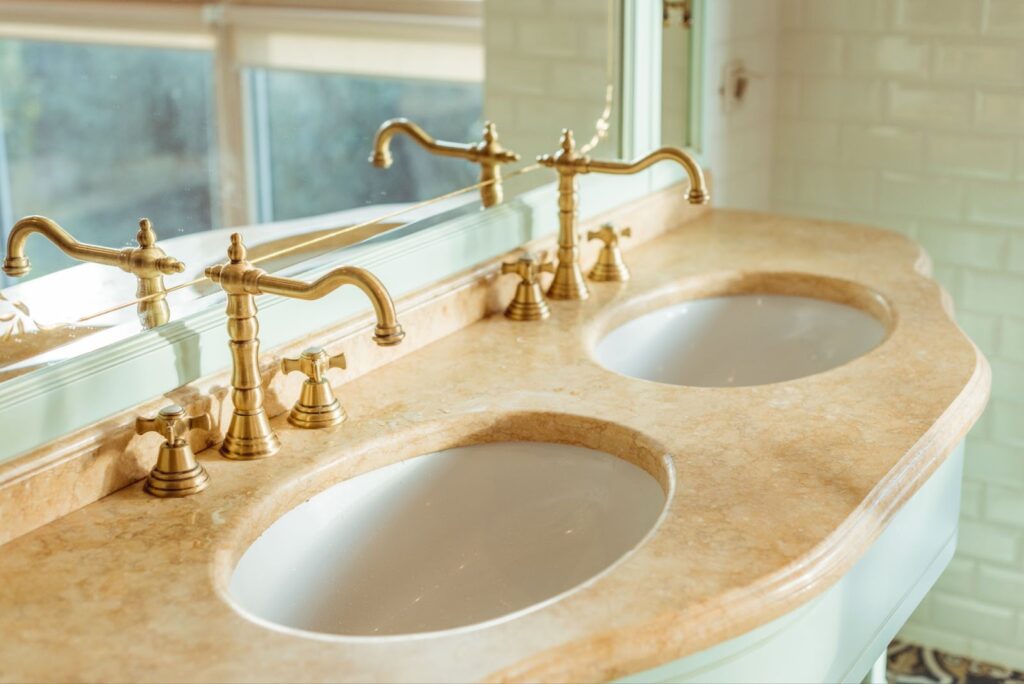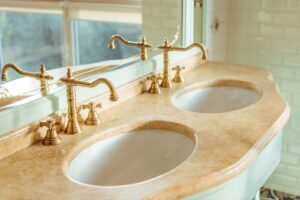Selecting the right bathroom countertops is a pivotal decision when undertaking a bathroom makeover, but where should you start?
The bathroom counter often serves as the focal point of the space. When done correctly, a countertop harmonizes with your tiles, cabinets, and walls while enduring the wear and tear of daily use.
With so many materials to pick from, it’s difficult to choose which best suits your house. In this blog, we’ll cover everything to consider when choosing a bathroom counter to make the process easier and more fulfilling.
Questions to ask yourself before purchasing bathroom countertops
Before diving into specific materials for your new bathroom countertops, consider the following questions to narrow down your options:
Will your counter be exposed to heat?
Heat is a practical concern for kitchen counters, but it also applies to bathrooms. Heat-generating hair appliances like curling irons and straighteners usually wind up on the counter. If you plan to use these tools in your bathroom, make sure your great hair day doesn’t cost you a new countertop. Opt for a heatproof material like granite stone countertops.
Could it crack?
Accidents happen, and bathroom counters need to be durable enough to handle them. If a hairdryer falls or playful children put it to the test, choose a material that will endure the unexpected without cracking.
What is my budget?
Your budget will significantly influence your choice as you hunt for the perfect countertops. Pre-built vanities and countertops are more affordable but offer limited customization. The cost of materials varies widely, with natural stones like granite being more expensive than synthetic options.
Is it prone to stains?
Some countertop materials are more porous than others. As such, they absorb the colors of dirt, cosmetics, dyes, and other substances more easily. Keep this in mind if you regularly apply makeup at the vanity, wash clothing in the sink, or clean up after messy activities.
Will it require a lot of upkeep?
Some counter materials are less durable than others, requiring more maintenance. If you have a busy schedule and don’t have the time or mental space to be careful about maintaining your bathroom counters, go for a more durable material.
Bathroom countertops materials
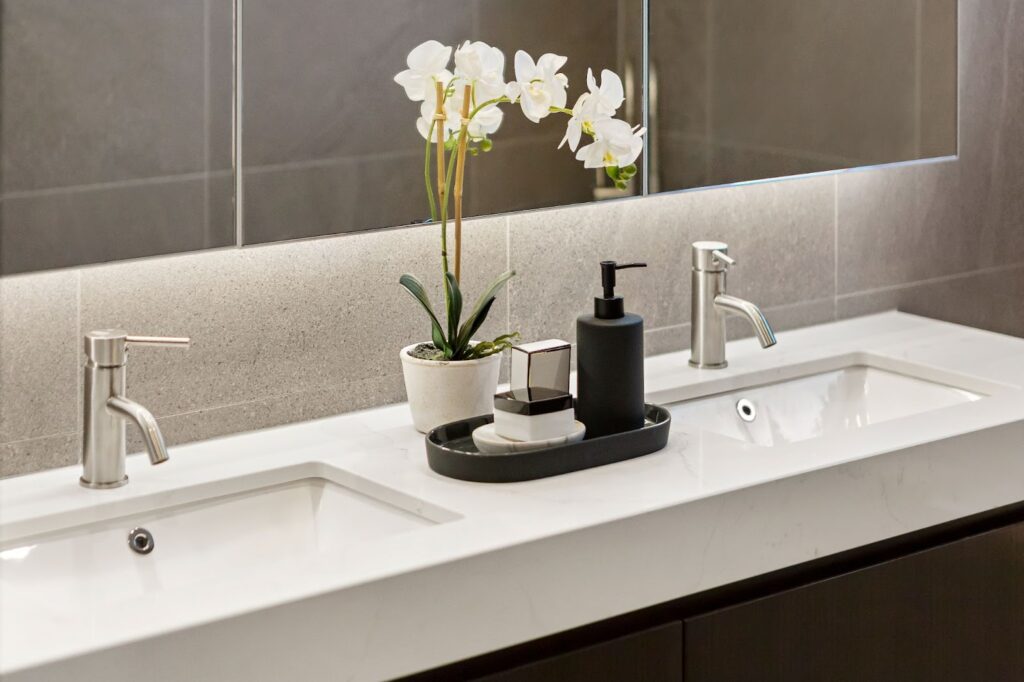
There are several types of countertop materials to consider. Here are seven of the most popular options:
- Granite
Granite stone countertops are a popular material for bathroom vanity tops and kitchens because of their beauty and durability. Granite stone countertops are a natural element that makes fantastic bathroom countertops because they are stain-resistant, heat-resistant, and they create a stunning focal point in the space.
Keep in mind that granite is often more costly than other materials. It also demand more upkeep and is difficult to install without expert assistance.
- Quartz
Bathroom quartz countertops are renowned for their durability and low maintenance. They easily withstand high heat and scratches. Any imperfections can be buffed out with fine-grade sandpaper. Bathroom quartz countertops come in various styles, some closely resembling natural stone slabs. Additionally, quartz often integrates sink basins for a seamless look.
Bathroom quartz countertops are among the more expensive options available. The higher cost is justified by their benefits. First, they are non-porous, which makes them resistant to stains and bacteria. Quartz also provides a variety of color options and design consistency to fit any décor style. Despite the initial investment, their longevity and minimal upkeep make quartz a valuable addition to any bathroom.
- Marble
Marble is a timeless and elegant choice with a high resale value. It comes in various colors and finishes and adds a touch of luxury to any bathroom. However, marble can be pricey and requires regular maintenance to keep it looking pristine.
Marble has a higher resale value than other materials like laminate or porcelain. It’s a status symbol that may boost the value of your property. While more expensive to install, the benefits pay off in the long run. Plus, marble countertops have a timeless appeal that will not go out of style.
- Wood
Wood vanity tops require proper sealing since wood is porous and prone to water damage. This is mainly an issue in seams where sinks and faucet fittings are installed. When a butcher-block counter is utilized, wood provides a warm, inviting feel as well as an organic aspect. Keep in mind that this is thicker in width, so you may need to swap out your existing plumbing connections.
- Ceramic
Ceramic tiles are crafted from clay, glazed on the surface, and fired to solidify. These tiles make a durable and attractive option for bathroom countertops. This material is an excellent way to save money, especially if you choose to complete the installation yourself. Ceramic tiles offer a wide range of colors, patterns, and styles for you to personalize to match your style.
There are some considerations to keep in mind when choosing ceramic tiles. Grout lines between the tiles may stain and discolor, so regular cleaning and resealing are necessary. Despite this, the affordability and versatility of ceramic tiles make them a popular choice for those looking to balance cost and style in their renovation.
- Laminate
Laminate countertops are created by bonding layers of plastic to a particleboard core. This recipe results in a durable and affordable surface. These pre-manufactured sections make for easy cutting and installation, which is ideal for DIY projects.
Laminate works well in guest bathrooms and powder rooms, as it offers a quick and cost-effective update. It’s also an excellent choice for renovations when preparing a property for sale. While less durable than pricier materials, laminate offers a variety of colors and patterns to fit any vision.
- Soapstone
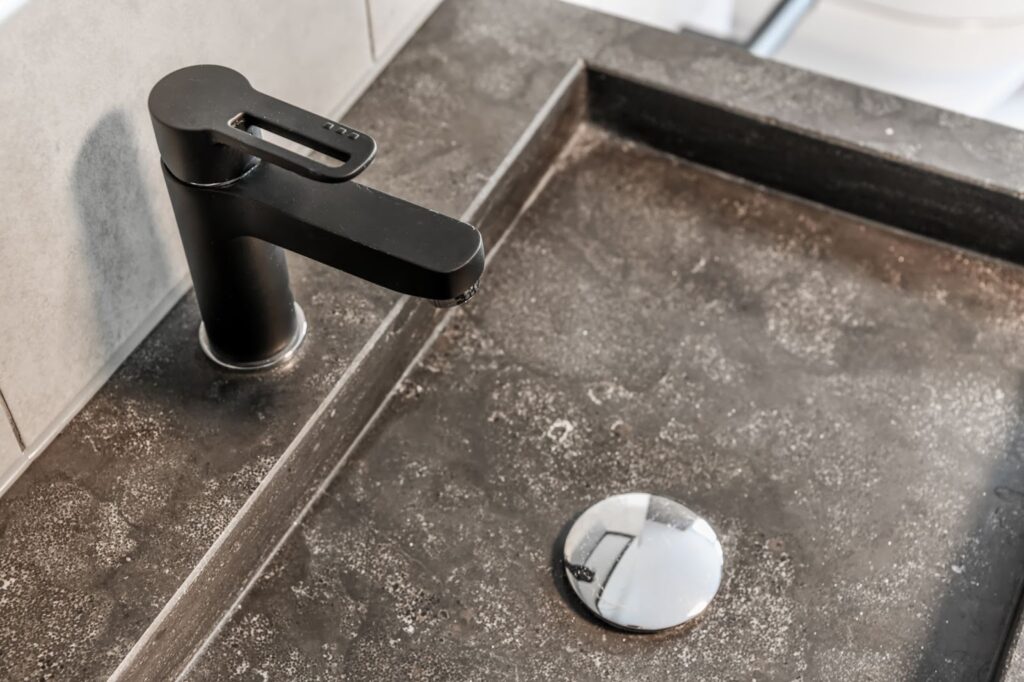
Soapstone countertops in bathrooms are practical in nature because of their utility and limited color possibilities. Nonetheless, they should be included for consideration because they offer a decent mid-range value for countertops and need little care. Soapstone countertops in bathrooms add a rustic vibe that brings any space to life.
Because soapstone is softer than other natural stone surfaces, it scratches more easily. Although it’s less expensive than other stone countertops, you must exercise caution when selecting this option. Soapstone darkens over time, so you must oil it on a regular basis. Rub mineral oil in with a hand towel. Oiling soapstone countertops in bathrooms assists in eliminating scratches and preserving its stunning color.
Considerations when choosing bathroom countertops
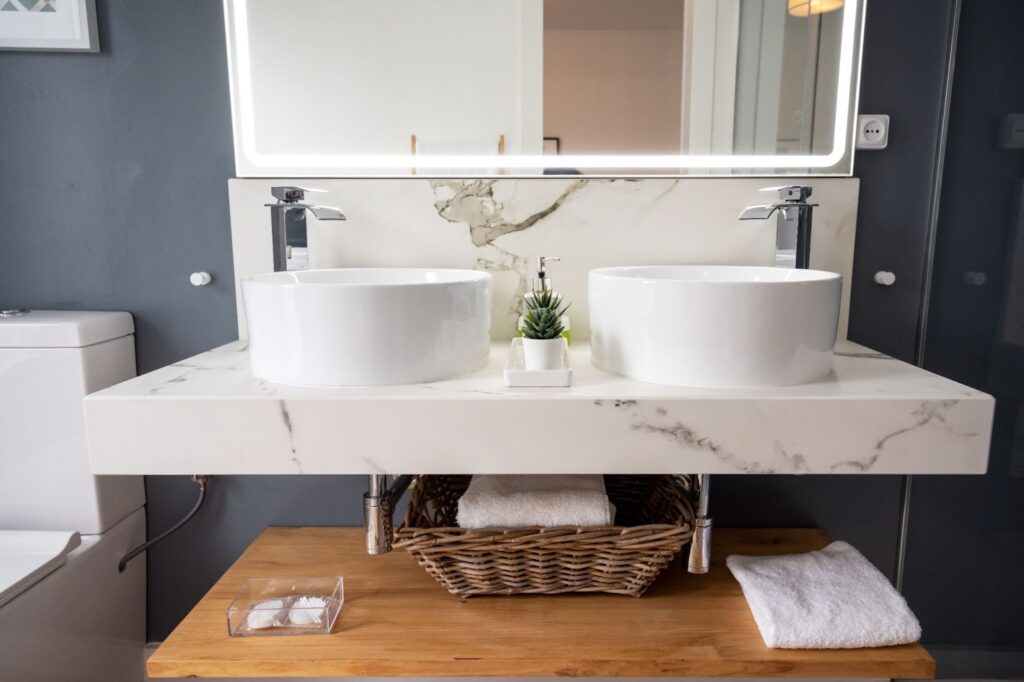
Here are a few more key points to consider when selecting countertops for your new and improved bathroom:
Know your space
The first step in renovating, constructing, or remodeling a bathroom is to take precise dimensions. Natural stone countertops, such as granite or marble, require careful measurement to determine the number of slabs needed. The same holds true for engineered stone countertops, such as quartz.
Accurate measurements are vital to determine how the slabs will fit into your area. Poor measurement may necessitate the use of additional materials or the creation of big seams across the center of your countertop. Spare yourself the misery by measuring your room several times.
Home design
Does your house lean toward a particular design style? Perhaps you have a farmhouse aesthetic, or everything in your home is midcentury modern. On the other hand, your home may be English countryside, elegant, southwestern, or industrial. Some houses are eclectic, while others are more conventional.
Whatever your design preferences, your new bathroom must complement the rest of your house. For example, clean white marble counters may not be the best option for a home decorated with shabby chic designs and ruffles.
Look at all options
There are several possibilities for bathroom countertops. The most popular options are granite, quartz, and marble. Natural stone and manufactured counters are the most durable and need little upkeep. Formica and laminate are less-priced choices. These materials are indeed less expensive, but they must be changed considerably more frequently, which may result in higher long-term costs.
Go professional
Choosing bathroom countertops may be daunting, so don’t tackle it alone. Having a professional team on your side can make all the difference between a failed DIY project and a stunning, magazine-worthy finish.
The correct staff will assist you with all aspects of the process, from design to implementation. It’s better to work with an expert from the start rather than starting on your own and realizing halfway through that you want assistance. Find a company that will assist with all aspects of your redesign, such as bespoke cabinetry and high-quality countertops.
Choose Intermountain Stone & Marble for your bathroom countertop needs
Are you ready to upgrade your bathroom with the timeless beauty of quartz, marble, or granite bathroom countertops? Look no further than Intermountain Stone & Marble. Our magnificent range, made from the best materials, promises to make your ideal kitchen or bathroom a reality.
Don’t sacrifice quality or beauty — pick Intermountain Stone & Marble for countertops that combine longevity and style so your house will exude refinement for years to come.
Contact Intermountain Stone & Marble today and let our specialists help you choose the ideal centerpiece for your room. Intermountain Stone & Marble is the first step in creating a gorgeous house.

